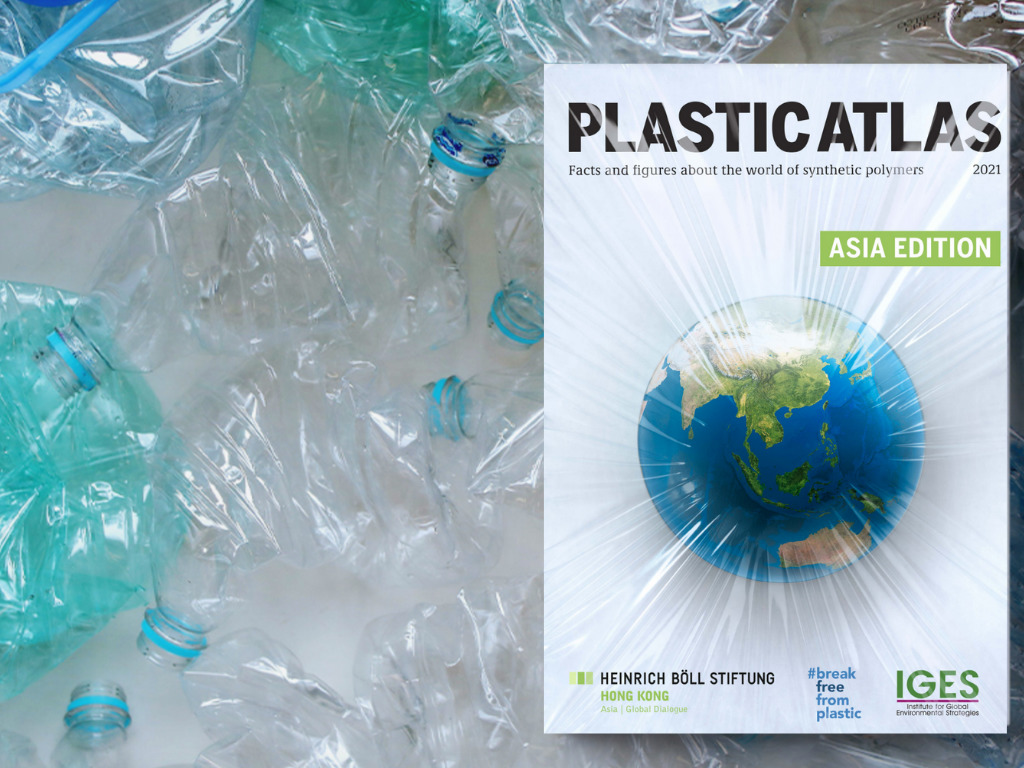Plastic Atlas: Latest Edition Highlights Asia’s Plastic Pollution Crisis & Assesses Potential Solutions
4 Mins Read
On Earth Day (April 22), the Heinrich Böll Foundation, the Break Free From Plastic movement, and the Institute for Global Environmental Strategies (IGES) together unveiled the new Asia edition of the Plastic Atlas in English. The newly launched Plastic Atlas Asia edition provides a regionally focused overview of the ever-growing plastic pollution crisis, including a chapter on the “plastic pandemic” that reveals how the oil and gas industry will scale up plastic production in the near future.
With 45 detailed infographics focussed on the region, the Plastic Atlas Asia explores the entire value chain of plastic and covers a broad range of topics revolving around the plastic pollution crisis, drawing attention to the role that plastic producers, consumers, and contributors play in the Asian economies and its impact on production, consumption, and disposal since the post-war period.
As a direct result, over half of the plastic produced globally originated from this region, and to tackle the same, the edition highlights potential solutions.
In a press release seen by Green Queen, Deputy Director of the Heinrich Böll Foundation Hong Kong office and Executive Editor of the Plastic Atlas Asia Edition, Clemens Kunze, said: “Since 99% of all plastics are made of fossil fuels and produce enormous amounts of greenhouse gas emissions along the entire lifecycle of plastic, it is clear that the solutions to the plastic and climate crisis need to go hand in hand. The petrochemical industry is planning a massive expansion of the plastic production infrastructure to flooding the global market with yet more waste and toxins. Through the Plastic Atlas, we hope to show our collective responsibilities as people of this region and call on governments and corporations to proactively find ways to lead us out of this crisis.”
Furthermore, the edition explores how due to the COVID -19 pandemic, there has been an increase in the consumption of single-use plastics and that the oil and gas industry are planning to accelerate its production in the coming years.
Since 99% of all plastics are made of fossil fuels and produce enormous amounts of greenhouse gas emissions along the entire lifecycle of plastic, it is clear that the solutions to the plastic and climate crisis need to go hand in hand
Clemens Kunze, executive editor, Plastic Atlas Asia Edition
Break Free From Plastic Asia Pacific Coordinator, Satyarupa Shekhar, added: “Asia plays a significant role in the plastic pollution crisis. This joint publication is envisioned to show the root causes of the problem in the region and tackle the deluge of plastic waste due to the COVID-19 pandemic, debunk the myth behind recycling as a panacea, and present the case for transforming communities to become zero waste as the ecological solution to the plastic pollution crisis.”
The petrochemical industry is planning a massive expansion of the plastic production infrastructure to flooding the global market with yet more waste and toxins. Through the Plastic Atlas, we hope to show our collective responsibilities as people of this region and call on governments and corporations to proactively find ways to lead us out of this crisis
Clemens Kunze, executive editor, Plastic Atlas Asia Edition
The publication investigates the process of recycling in-depth, showing that it is far from the ideal solution to the waste crisis despite being promoted extensively by governments and corporations as the main way out.
Instead, several activist movements and non-profit organisations have embraced better practices to reduce plastic production and consumption, such as circularity, zero-waste behavioural change and assessing the problem from the bottom-up, all of which need further backing from politicians and other stakeholders.
Apart from this, a photo exhibition titled ‘Journey to the Waste’ was held in Hong Kong showcasing winning entries from a recent photo competition to raise awareness about plastic pollution in the region.
Further, a media briefing was conducted for the Asia edition launch that delved into the current impacts of the ongoing pandemic on single-use plastics.
In an exclusive interview with Green Queen last month, Melati Wijsen the 20-year-old co-founder of Bye Bye Plastic Bags, a Bali-based youth-driven movement that works to eliminate the use of plastic bags in Bali and around the globe, shared her thoughts on how apart from consumers, the government action is equally essential to deal with this problem.
“Well, I think with plastic bags, one part of it was empowering the individual. But I think we always were urging for policy change because we understood that regulation is key. What we do need to start seeing is the systemic change and solutions that are accessible to all, ones that leave no one behind. I think regulation, policy change, systemic change, is what is key in any changemakers’ role, not only to inspire the individual but to make sure that we’re holding those in positions of power accountable as well.”
Wijsen added that in 10 years, she hopes that the Sustainable Development Goals have been achieved. “In Bali, we have a philosophy and a way of life here in Bali that we call Tri Hita Karana, about being in harmony with the natural world, the community around you and the spirit within. It’s an old tradition and lifestyle, so interestingly enough, when I think about the future, I hope we can go back to living in connection with everything around us. “
Apart from the publication launch, in Indonesia, a group of producers and creatives released a documentary film on Earth Day called Pulau Plastik (Plastic Island) taking viewers on a journey of three individuals drawing attention to the extent of the plastic crisis in the country, and the fact that it enters the food we consume and what we can do as a community to resolve this issue.
Lead image courtesy of Plastic Atlas.




